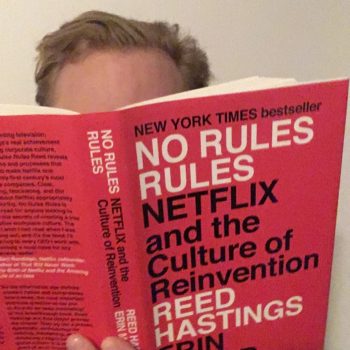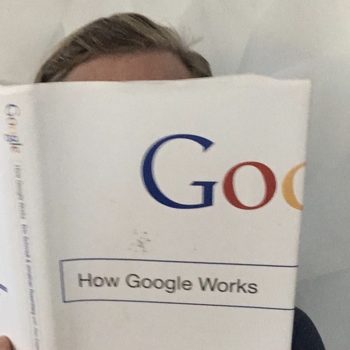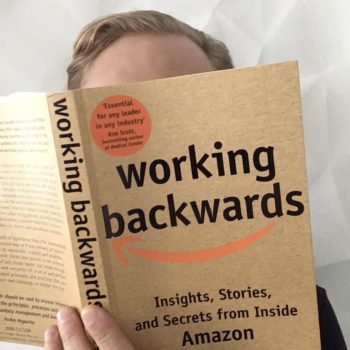
No Rules Rules
Netflix and the Culture of Reinvention
Categories:
Favorite,
CTO,
Tech Recruiter,
Startup Founder
How strongly do I recommend No Rules Rules?
9 / 10
Review of No Rules Rules
No Rules Rules is fundamentally about Netflix culture and philosophy around people management. I appreciated both the transparency presented and the ability of Netflix to diverge or apply innovation to people management.
In sharp contrast to books about Amazon culture which obsesses over customers, this Netflix book scarcely mentions the customer. And where Google focuses on technical innovation, this book about Netflix emphasis culture and interpersonal interactions.
Top Ideas in This Book
- Talent density lies at the root of all Netflix hiring, compensation, and retention decisions
- One superstar is better than two average people
- Adequate performance gets a generous severance package
- Paying top of market is less expensive in the long run for high performance industries
- Spend money as you see fit in the best interest of Netflix
- The day you question giving candid feedback is the day you should leave Netflix
- Lead with context not control
- Innovation increases when the boss stops playing the role of decision approver
- At Netflix you lose your job for not placing enough bets
- Apply the Keeper Test to each employee on your team
Talent density lies at the root of all Netflix hiring, compensation, and retention decisions
At Netflix the goal is to establish and maintain the highest possible talent density. With high talent density, managers can loosen controls which increases innovation, speed, and commitment. You can’t do that with low talent density.
One superstar is better than two average people
Netflix philosophy is that innovation stems from the most talented people, not from average talent. To that end Netflix would rather hire one superstar than two average people.
Although talent density and not cost is the primary driver, the cost benefits are also clear when one superstar usually costs 20-50% more than a single average person, but still less than two average people.
Adequate performance gets a generous severance package
When you accept a role at Netflix, you also accept the high intensity rules of the game. You will be compensated very well but Netflix employees are terminated at double the industry rate and you will be one of them if you only deliver adequate performance.
Paying top of market is less expensive in the long run for high performance industries
Netflix has a policy for when recruiters contact Netflix employees: ask them how much the new role pays. Employees enter that value into a Netflix database and Netflix will match or exceed the offer. This helps Netflix retain talent, which not only keeps production and innovation moving forward, but also reduces talent acquisition costs.
Hastings also points out that managing average and low performing employees is more expensive and time consuming than high performers, something any people manager inside or outside of Netflix knows well.
Spend money as you see fit in the best interest of Netflix
Originally Netflix started with a philosophy of spend Netflix money as you would your own, but discovered that some employees are personally very frugal where others live lavishly. The company revised its guidance to spend money in the best interest of Netflix.
Spending and budgeting decisions at Netflix are highly distributed with employees having autonomy to spend money in the best interest of Netflix. There are very few to no limits on spending, but there are accountability mechanisms in place to ensure you are spending money in the interest of the company.
The day you question giving candid feedback is the day you should leave Netflix
Most employees at Netflix provide feedback on 10-40 other employees. The 360 feedback process is centered around candor, but candor is also culturally enforced on a daily basis.
Lead with context not control
The authors say the biggest problem in business is the sheet misunderstanding of how business works. Most employees at most companies get siloed in their function – engineering, design, etc. – but never truly grasp the larger business context. In failing to train employees to understand context, companies fail in driving entrepreneurship and innovation.
Innovation increases when the boss stops playing the role of decision approver
Decision approval is a form of control. When you constantly need your bosses’ approval, you enter down a path of trying to please your boss more than the customer. Getting out of the way isn’t enough, bosses must lead with context so they feel comfortable getting out of the way.
At Netflix you lose your job for not placing enough bets
Netflix has the idea of chips, as in gambling chips. At the start of your employment you are conceptually given chips to place bets with the company expecting some of those bets to be losers.
But losing on a bet isn’t how you get fired at Netflix, You get fired for not placing enough bets because Netflix has a culture of calculated risk taking aimed at producing innovation.
Apply the Keeper Test to each employee on your team
For each person on the team you manage, ask yourself, “If they put in their notice, would I try hard to keep them? Or might I feel a slight sense of relief?”
If you wouldn’t fight to keep them then they don’t belong at Netflix.


